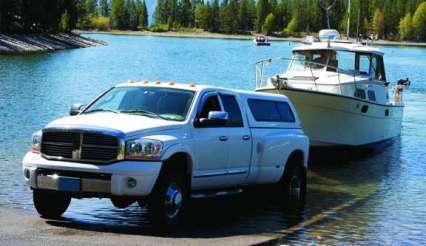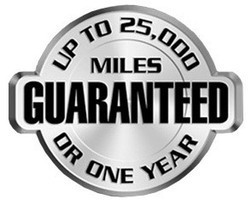INDEPENDENT NATIONAL DEALER
Nationwide-USA
San Diego, CA
(800) 653-0323
What to Know Before you Tow
AMSOIL products designed especially for towing applications
Ed Newman's Towing Tips
Friends
of mine down in the Twin Cities were driving southbound on Highway 35,
talking about this and that, minding their own business, when wham! The
side of their car was slammed by a northbound trailer with a boat on it.
The trailer had become disconnected from the tow vehicle and flew
across the median in a high velocity trajectory that could have killed
our friends had it not been a glancing side scraper. Though the
shattering glass put them in the hospital, it could have been much
worse. It was an accident that shouldn’t have happened.

Whether
it’s a boat, a house trailer or your trash to the dump, towing requires
attention to details. Here are nine key details to pay attention to for
safe towing and longer vehicle life.
1) Weight
Make
sure your trailer and whatever you’re hauling is within the tow
capacity of your vehicle. Check the owner’s manual to find the trailer
types that your vehicle can haul and the maximum load weight it can
pull. Use the right trailer hitch and make sure it is hitched correctly.
2) Weight Distribution
If
you experience fishtailing, where your trailer sways while
accelerating, back off the gas and see if it stops. If it continues when
you accelerate again, check to see how the weight is distributed on the
trailer. It may not be distributed evenly from side to side, or else
it’s too far back to put a sufficient load on the hitch ball. You want
to try to carry 5 to 10% of the trailer load on the hitch. Redistribute
the load as necessity dictates before continuing.
3) Lights
Connect
brakes and signal lights. Double check to make sure the trailer’s
brakes, turn signals and tail lights are synchronized with those of the
tow vehicle.
4) Tires
I
knew some people who had seventeen blowouts while pulling their trailer
from California to South Texas. (True!) You would think they could have
figured it out. They had too much weight in the trailer. Be sure you
keep the proper air pressure in your tires, too.
5) Handling
When
towing, you’re operating a vehicle combination that’s longer and
heavier than you’re used to. So you’ll want to make compensating
adjustments in your normal driving practices.Backing up is tricky, but
it’s a skill you can learn. Till you’re experienced, have someone direct
you from outside in those tight spots or places where you have limited
visibilty.When barreling down the highway, avoid sudden turns. I know,
sounds obvious. ButI was once the first person to an accident where
someone decided at the last minute to take the exit instead of going
straight. The car ended up upside down because the trailer had other
ideas.
6) Buckle Your Seat Belt
In case your tow vehicle ends up upside down.
7) Stopping
It’s
a matter of physics. When towing, you have more momentum than you would
without a trailer. Be sure you keep in mind that it therefore takes
more time and distance to stop. Avoid tailgating and pay attention to
what’s happening a little further down the road than you normally would.
8) Check Things Out As You Go Along
Maybe
you forgot to fasten a chain, forgot to clamp the hitch or forgot to
tie your car down. You’re in a hurry to get home after a long night.
Things like that can happen. Once you’re on the road, make sure
everything looks good back there. You really don’t want to be up all
night trying to get your car out of a ditch somewhere. I know a boat
owner whose yacht fell sideways on a two-lane highway halfway between
Canada and Duluth, the middle of nowhere. Something wasn’t fastened
properly. Bummer.
9) Synthetic Transmission Fluid
What
kind of lubricant are you using in the transmission of your tow
vehicle? Towing is one of the most demanding activities on a vehicle’s
drivetrain system. In fact, because of the heat generated, towing is
probably the number one killer of transmissions. For this reason many
people install an oil cooler. An alternative is to use a high end
synthetic lubricant. As a result of the reduced friction, the tranny
will run cooler, and transmission life will be lengthened considerably.
For example, AMSOIL synthetic automatic transmission fluid provides
useful service up twice as long as conventional fluids. And our
premium Signature Series Fuel-Efficient Synthetic ATF also has a fuel
economy benefit.
When it comes to towing accidents, don’t say “It can’t happen to me.” Say instead, “It must not happen to me.
”Right
now many states are calling for stiffer penalties when there are
accidents caused by trailers that break loose. It will be criminal
negligence, not a mistake. Pay attention to the details. Hitches, safety
chains, handling, weight, the capacity of your tow vehicle, tires and
all the rest will insure that you’re back in the running next week.
AMSOIL Means Opportunity
We will get back to you as soon as we are able.

AMSOIL guarantees the performance of its products, so you can be confident they perform as advertised. AMSOIL introduced the world’s first API-qualified synthetic motor oil and has since introduced a full line of industry firsts. For more than 40 years, AMSOIL synthetic lubricants have proven themselves in the lab, on the racetrack and on the highway.